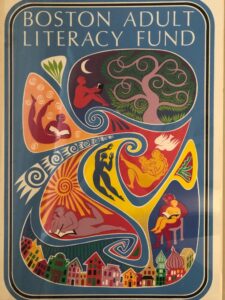Why First Literacy
Guest post By Karen Morrissey, Former First Literacy Board Member
 Non-profit organizations are formed for many reasons – to answer a societal need, to provide a community service, or to support a specific constituency. In some cases, nonprofits are created to fill a gap in what a society, government, or community can provide. These organizations, like First Literacy, bring together resources from private and public institutions to solve problems and make a difference in their communities.
Non-profit organizations are formed for many reasons – to answer a societal need, to provide a community service, or to support a specific constituency. In some cases, nonprofits are created to fill a gap in what a society, government, or community can provide. These organizations, like First Literacy, bring together resources from private and public institutions to solve problems and make a difference in their communities.
How We Got Our Start
In 1988, Boston Mayor Ray Flynn recognized that there was little or no money available, public or private, to provide literacy classes or services for adults living in the city.
With thousands of people needing such services, a public and private sector partnership was established to fill the gap. First Literacy (formerly known as Boston Adult Literacy Fund) was founded to raise money for adult literacy education programs in the City of Boston.
Since 1988, First Literacy has been providing grants to Adult Basic Education (ABE) and English for Speakers of Other Languages (ESOL) organizations, professional development to ABE and ESOL teachers, and scholarships to adult learners in the Greater Boston area.
Why Adult Literacy
Today, the need for English literacy services is even greater. In Massachusetts, 14.28% of adults lack a high school diploma and have limited proficiency in conversational English.
Lack of literacy skills is a personal strain, as well as a societal problem. An adult who cannot speak, read, or write proficiently in English will struggle to provide for themselves and their families; they are often isolated due to embarrassment, and are less able to contribute to their community. According to ProLiteracy, low literacy costs the U.S. $2.2 trillion or more each year in non-productivity in the workforce, crime, and loss of tax revenue due to unemployment.
As a society, lack of literacy skills creates additional costs to health and human services due to people not being able to access appropriate health care and understand the need for preventative care. Low-literate adults struggle to advocate for their families, participate in their children’s schooling, and attain higher paying jobs.
Government funding can also be difficult to access and seeking private funding is a full-time job for many nonprofits and small community-based organizations, thus detracting from their ability to provide services.
The bottom line … we need adult literacy education. Through First Literacy scholarships, grants, and teacher workshops we help ensure that adults with low-literacy or limited English proficiency have high-quality educational opportunities that enable them to thrive as individuals and as family members, in their workplaces, and in their communities.
Join us by supporting adult literacy education – an important player in the health and welfare of our society.
